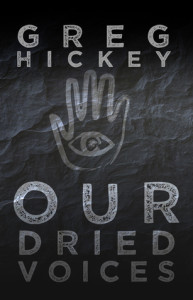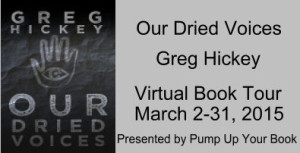Samuel from Our Dried Voices by Greg Hickey
We’re thrilled to be talking to Samuel from Greg Hickey’s novel, Our Dried Voices. It is a pleasure to have him with us today at Pimp That Character!
Q: Thank you for your interview, Samuel. Can you tell us your story?
A: I know one story. But it is very long. I am not a Storyteller. I am just another person like the others. Maybe a little different. Penny and me, I think we are different. I live in a place with lots of grass and some trees. There is a building where I sleep. Another where I eat. When it is time to eat, the food comes to us from a hole. A hole in the wall of the building. Sometimes water comes from the sky. But most times the sky is light. Unless something goes wrong. Things have started to go wrong. Doors are locked. Food does not come. There is more sky water. Rain. There were heroes and they fixed some things. But they have gone now. I will try to fix things.
Q: Where do you go when you are angry?
A: I like to go to the fence. It is far from the buildings and the river. It is quiet there. There are not so many others. I can see the mountains all around. And the meadow outside the fence is empty and free.
Q: What makes you laugh out loud?
A: I do not remember laughing very much. Penny has made me laugh. She pretends to talk like the others. But she can talk right. She is not like them. And I am so happy to know that she is different.
Q: What is your most treasured possession?
A: I have a piece of metal in my pocket. I think it came from a window in one building where we eat. I found it on the floor there. I use it to open doors that will not open and to fix other things.
Q: What is your greatest fear?
A: There are others that come from the mountains to attack us. They break the food machines. They close the doors. They make the papers I find to share their plans. And now there are no more Heroes. There is me and Penny. How can we stop them?
Q: Do you have children?
A: Is that like Sully and Penny in the story? Small people? There are small people in the colony. I was small once but I grew bigger. You ask if I have a small person. I do not know. I have clothing. I have a bed. I have the metal in my pocket. I do not think I have any people, big or small.
Q: What’s your idea of a perfect meal?
A: When all the meal cakes are all the same size. I do not have to break them up to give to the others. I take my meal cake and eat with Penny in the meadow under a tree.
Q: If you knew you were going to die tomorrow, what would you do today?
A: What is “die?” Is it like when some of the others drank the bad river water? They fell to the ground and slept with their eyes open and did not wake up. I do not want to sleep and never wake up. If I would never wake then I would never sleep. I would climb trees and swim in the river and go over the fence to the mountains. I would never go to bed again.
Title: Our Dried Voices
Author: Greg Hickey
Publisher: Scribe Publishing Company
Publication Date: November 4, 2014
Pages: 234
ISBN: 978-1940368931
Genre: Dystopian / Science Fiction
Format: Paperback, eBook (.mobi / Kindle), PDF
In 2153, cancer was cured. In 2189, AIDS. And in 2235, the last members of the human race traveled to a far distant planet called Pearl to begin the next chapter of humanity. Several hundred years after their arrival, the remainder of humanity lives in a utopian colony in which every want is satisfied automatically, and there is no need for human labor, struggle or thought. But when the machines that regulate the colony begin to malfunction, the colonists are faced with a test for the first time in their existence. With the lives of the colonists at stake, it is left to a young man named Samuel to repair these breakdowns and save the colony. Aided by his friend Penny, Samuel rises to meet each challenge. But he soon discovers a mysterious group of people behind each of these problems, and he must somehow find and defeat these saboteurs in order to rescue his colony.
Book Excerpt:
Greg Hickey was born in Evanston, Illinois in 1985. After graduating from Pomona College in 2008, he played and coached baseball in Sweden and South Africa. He is now a forensic scientist, endurance athlete and award-winning writer. He lives in Chicago with his wife, Lindsay.
You can visit Greg’s website at www.greghickeywrites.com.
Connect with Greg:
Author Website: www.greghickeywrites.com
Author Blog: http://kinesophy.blogspot.com/
Facebook: https://www.facebook.com/GHWrites
Twitter: https://twitter.com/greghickey5 Goodreads: https://www.goodreads.com/author/show/8421481.Greg_Hickey
Q: Thank you for your interview, Samuel. Can you tell us your story?
A: I know one story. But it is very long. I am not a Storyteller. I am just another person like the others. Maybe a little different. Penny and me, I think we are different. I live in a place with lots of grass and some trees. There is a building where I sleep. Another where I eat. When it is time to eat, the food comes to us from a hole. A hole in the wall of the building. Sometimes water comes from the sky. But most times the sky is light. Unless something goes wrong. Things have started to go wrong. Doors are locked. Food does not come. There is more sky water. Rain. There were heroes and they fixed some things. But they have gone now. I will try to fix things.
Q: Where do you go when you are angry?
A: I like to go to the fence. It is far from the buildings and the river. It is quiet there. There are not so many others. I can see the mountains all around. And the meadow outside the fence is empty and free.
Q: What makes you laugh out loud?
A: I do not remember laughing very much. Penny has made me laugh. She pretends to talk like the others. But she can talk right. She is not like them. And I am so happy to know that she is different.
Q: What is your most treasured possession?
A: I have a piece of metal in my pocket. I think it came from a window in one building where we eat. I found it on the floor there. I use it to open doors that will not open and to fix other things.
Q: What is your greatest fear?
A: There are others that come from the mountains to attack us. They break the food machines. They close the doors. They make the papers I find to share their plans. And now there are no more Heroes. There is me and Penny. How can we stop them?
Q: Do you have children?
A: Is that like Sully and Penny in the story? Small people? There are small people in the colony. I was small once but I grew bigger. You ask if I have a small person. I do not know. I have clothing. I have a bed. I have the metal in my pocket. I do not think I have any people, big or small.
Q: What’s your idea of a perfect meal?
A: When all the meal cakes are all the same size. I do not have to break them up to give to the others. I take my meal cake and eat with Penny in the meadow under a tree.
Q: If you knew you were going to die tomorrow, what would you do today?
A: What is “die?” Is it like when some of the others drank the bad river water? They fell to the ground and slept with their eyes open and did not wake up. I do not want to sleep and never wake up. If I would never wake then I would never sleep. I would climb trees and swim in the river and go over the fence to the mountains. I would never go to bed again.
About The Book
Title: Our Dried Voices
Author: Greg Hickey
Publisher: Scribe Publishing Company
Publication Date: November 4, 2014
Pages: 234
ISBN: 978-1940368931
Genre: Dystopian / Science Fiction
Format: Paperback, eBook (.mobi / Kindle), PDF
Purchase
The Book:
Amazon: http://www.amazon.com/Our-Dried-Voices-Greg-Hickey-ebook/dp/B00N272GLO/ref=sr_1_1?s=digital-text&ie=UTF8&qid=1421353811&sr=1-1&keywords=Our+Dried+Voices+Greg+Hickey
Barnes & Noble: http://www.barnesandnoble.com/w/our-dried-voices-greg-hickey/1119998270?ean=9781940368931&itm=1&usri=our+dried+voices
In 2153, cancer was cured. In 2189, AIDS. And in 2235, the last members of the human race traveled to a far distant planet called Pearl to begin the next chapter of humanity. Several hundred years after their arrival, the remainder of humanity lives in a utopian colony in which every want is satisfied automatically, and there is no need for human labor, struggle or thought. But when the machines that regulate the colony begin to malfunction, the colonists are faced with a test for the first time in their existence. With the lives of the colonists at stake, it is left to a young man named Samuel to repair these breakdowns and save the colony. Aided by his friend Penny, Samuel rises to meet each challenge. But he soon discovers a mysterious group of people behind each of these problems, and he must somehow find and defeat these saboteurs in order to rescue his colony.
Book Excerpt:
I
The sound of the bells echoed across the colony.
They sounded five times, and by the end of the fifth peal everyone had stopped
what they were doing and started to walk toward the nearest source of the
noise. The bells had a tinny, hollow sound to them. To be sure, it was
unmistakably the sound of bells, but it lacked that rich, thunderous, rolling
swell once heard in passing by an old church at the top of the hour. Instead,
it was as though the sound of real bells had been recorded and re-recorded ad
infinitum until only bell-like sounds now remained.
The bells called the people to the midday meal. All
across the lush meadow, the colonists fell into a kind of reverie. Moments
earlier, they had been romping through the meadow or splashing in the river
with the joyful abandon of children, while others napped blissfully at the base
of a modest hill or fornicated with some momentary lover in the shade of a
spreading tree. But now their innocent laughter, their hushed excited voices,
their intermittent shrieks of pleasure all ceased for an instant as they moved
as one toward the sound of the bells. As soon as the fifth toll had faded in
the air, the human noise resumed as though it had never been silenced. The
colonists walked eagerly but unhurriedly, small, hairless, brown-skinned
people, all barefooted and dressed in simple, cream-colored smocks.
The bell sounds came from the seven meal halls
spread throughout the colony—long, tall, rectangular buildings erected from the
black, craggy rock characteristic of the mountains of Pearl, now smoothed down and
cut into bricks and painted a soothing off-white. Another smaller building
abutted one end of each meal hall. Their wan stone façades matched those of the
larger halls and there were no discernible entryways in their solid exteriors.
As the colonists entered each meal hall, they lined
up along the right-hand wall to wait for their food. The walls were painted a
pale sky blue, and on the far wall was a small square hole. One by one, each
diner stepped forward in line, a small, red light above the hole flashed, a
short clicking and whirring noise sounded and then a round, firm, dark brown
cake appeared at the edge of the opening. One by one, each colonist took the
proffered meal cake and carried it over to one of the many wooden tables or out
into the meadow.
Near the front of the line at one hall, a male
colonist turned to face the man behind him.
“Hellohoweryou?” said the first man.
“Goodthankshoweryou?” replied the second man.
“Goodthankshoweryou?”
“Goodthankshoweryou?”
The two men stared blankly at each other for a
moment. Then the first man blinked and said “Goodweathertoday.”
The second bobbed his head and grinned.
“Betterenyesterday.”
They continued to gaze at each other with vapid
expressions until the first man turned around and stepped forward in line. The
two men were right. It was Tuesday. It rained on Mondays. And thanks to the
colony’s weather modification system, it had rained every Monday, and only on
Monday, for hundreds of years.
***
When about half the colonists at this particular
meal hall had received their food, an adult woman moved to the front of the
line. A young boy, no taller than her waist, stood behind her. The woman
stepped up to the wall, the red light above the hole flashed… and nothing
happened. There was no clicking, no whirring, and no meal cake emerged from the
hole in the milky blue wall. Some people a few places behind the first woman,
by now so accustomed to the regular pace of the line, stepped forward in
anticipation of her taking the food and continuing on. When the line did not
move, they bumped awkwardly into the colonists in front of them, very much
surprised that there should be a fleshy, breathing, human body in their path
instead of empty space. Those closest to the front of the line fell silent when
they saw the woman had not yet received her meal, and then the silence spread
evenly and rhythmically down the line, like a row of pillowed dominoes falling
to the floor. Yet all the colonists continued to wear the same insipid
half-grin on their faces as they waited patiently for the food to be dispensed
and the line to creep forward once more.
A long, loud, whining shriek from the young boy
waiting with his mother at the front of the line broke through the stillness,
and it was this sound, not the actual interruption of the food service, which
seemed to have the greatest effect on those in the hall. The boy did not cry.
He shed no tears, and the sound which emerged from his mouth was not a
breathless and choked sobbing, or even the petulant howl of a child’s tantrum.
It was a primal, animal moan that rose from the depths of his unfilled stomach,
rushed up his throat with a cold and persistent ferocity and forced its way
over his teeth, throwing his head back as it broke from his lips. No one tried
to comfort the boy. His mother did not even turn around to look at him. Her
weak smile faded, but she continued to stare at the dark hole in the wall,
still waiting for her meal to appear. Then a child some dozen places back in
the line picked up the boy’s howl, and then a woman farther behind did the
same. Soon the entire line was wailing loudly.
Those colonists who had already received their
meals hunkered over their cakes and stuffed their last bites into their mouths.
One of them stood up, bumping hard into his table. The rest followed. They
walked hurriedly to the door, brushing past the onlookers from outside who had
gathered to see what all the noise was about. Those still in line stared
dazedly at the others around them, at the now half-empty hall, an incipient
question forming somewhere deep in their skulls.
A man in the middle of the line broke their
unsteady ranks first. He ran, stumbling over tables and chairs bolted to the
floor in his maddened dash toward the doorway. The rest of the line scattered
in his wake. Out through the door they went, cracking bony limbs on the wooden
furniture in their paths, pushing and trampling one another as they all tried
to force their way through the doorway at once, like blood cells pumped through
a clotted artery.
Those who had already finished their meals stood
outside in a loose ring several meters away from the entrance of the food hall,
and as the wild runners pushed their way through the door, they began to run as
well, picking up the wail of the unfed as they went. They ran in no particular
direction, a single mass exodus from the hall, teeming out across the gay green
meadows, up and over the soft, undulating hills, and their cries rippled
throughout the once-peaceful fields to fill the void left by the cessation of
the bells with a sound far more vibrant than those stale chimes which had just
called them to their uneaten meal.
Discuss this book in our PUYB Virtual Book Club at Goodreads by clicking HERE
About The Author
Greg Hickey was born in Evanston, Illinois in 1985. After graduating from Pomona College in 2008, he played and coached baseball in Sweden and South Africa. He is now a forensic scientist, endurance athlete and award-winning writer. He lives in Chicago with his wife, Lindsay.
You can visit Greg’s website at www.greghickeywrites.com.
Connect with Greg:
Author Website: www.greghickeywrites.com
Author Blog: http://kinesophy.blogspot.com/
Facebook: https://www.facebook.com/GHWrites
Twitter: https://twitter.com/greghickey5 Goodreads: https://www.goodreads.com/author/show/8421481.Greg_Hickey





Comments
Post a Comment